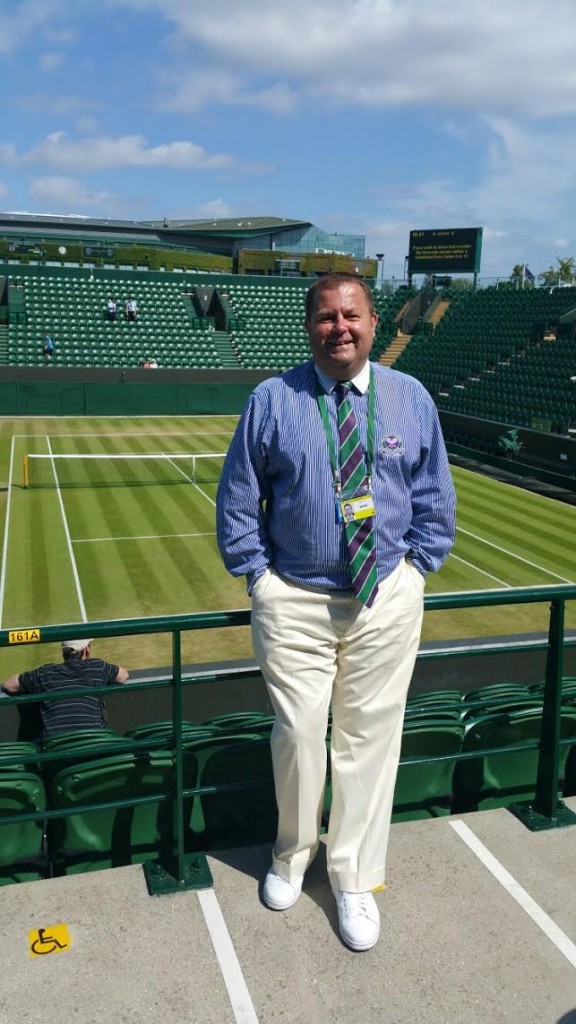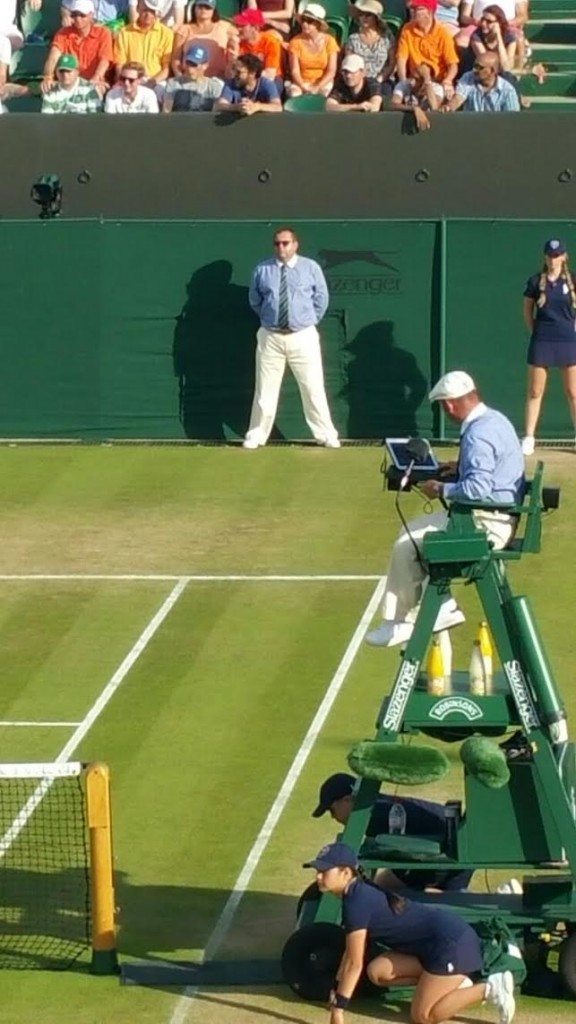 Abraham Lincoln
If given the truth, the people can be depended upon to meet any national crisis...
Abraham Lincoln
If given the truth, the people can be depended upon to meet any national crisis...
 Guildford news...
for Guildford people, brought to you by Guildford reporters - Guildford's own news service
Guildford news...
for Guildford people, brought to you by Guildford reporters - Guildford's own news service
Dragon Interview: Ferenc Hepp – Wimbledon Line Umpire
Published on: 17 Jul, 2015
Updated on: 17 Jul, 2015
Most of us watch the tennis from Wimbledon at some stage, even if it is only the top matches or those with a British interest. And quite a few of us from Guildford actually go up to the All England Club, just over 20 miles away.
Have you ever wondered where they get the officials from, what training they do, what is their daily routine at the tournament?
Ferenc Hepp lives in Milford and works at the University of Surrey. He is also a Wimbledon line umpire. Here he tells us all about it…

Ferenc in action with the the seven times Wimbledon champion, and this year’s (2015) runner-up, Roger Federer.
How did you become a line umpire at Wimbledon? Can anyone apply?
I have been a keen tennis player since a young age and therefore was lucky enough to get to Wimbledon as a spectator soon after moving to England from Hungary in the late 80s. I remember watching the action on the outside courts and standing behind one of the line judges thinking: “I can do this!” So I looked into the work of the British Tennis Umpires Association as it was then, it is now the Association of British Tennis Officials, filled in an application form and was invited to take part in a talk and practical session at the covered courts opposite the All England Club.
At this seminar we were introduced to the work of the association and also took part in a short on-court session, calling balls in or out thrown by a ball machine. Following that, I was told that I was suitable for further training and practised calling lines at local non-professional events such as club finals.
Having been watched and assessed during this period, I was invited to take part in a ‘Basic Course’ at Bisham Abbey, which was a weekend residential course, comprehensively covering the rules of tennis in the classroom.
I passed the course in the autumn of 1991 and my first Wimbledon was 1994. It takes time and dedication to be able to officiate at Wimbledon, and you do have to do certain number of days elsewhere too through the year, you cannot just work at Wimbledon each year without being at other events. However, anyone can apply, and the easiest way of doing this is to look at the officiating section of the Lawn Tennis Association website www.lta.org.uk.
Do you get paid or receive free tickets?
At Wimbledon the officials receive a fee, which varies according to grade. At other events it is expenses only.

Frenc at Wimbledon during one of his down-time periods. When on duty linejudges do an hour on and an hour off in rotation.
What kind of training is involved?
There is continuous training and assessment of officials. In order to progress through the chair umpire and line umpire grades, one of the conditions is to pass various courses along the way.
For example, there is an “Advanced Linejudge Course” in order to be eligible for a higher grade and therefore have the opportunity to call lines on show courts at Wimbledon.
Only the top grade line umpires are eligible to be selected for the finals. Similar training is available for chair umpires for progressing through from only working at non-professional events, to higher grades and badges who are expected to work at certain number of professional events.
The majority of the chair umpires who officiate the main draw matches and finals on Centre Court and other show courts at Wimbledon would have achieved their silver or gold badge after extensive training.
At Wimbledon, you may see line umpires hand a card to the chair umpire every time they walk on court. This is because we are assessed by the chair umpires every time we work on a match. The card has our names and court positions on, and we can be marked depending on our performance. For example, if there were a number of good close calls on our line, we would receive a positive mark, or if there had been a number of overrules, we may get marked down for that session.
Are you able to appreciate a game, at which you are officiating, as a tennis fan?
Yes, I am able to appreciate the games, as well as concentrating on my job as a line umpire. With sufficient practice, you will develop the ability to have a peripheral view of the game at the same time as ensuring that if there is a danger of a ball landing near the line you are watching, you are able to call appropriately and promptly once the ball has landed.
Are you pleased that technology has been introduced to enable your decisions to be reviewed?
Yes I am. It avoids lengthy arguments between players and chair umpires which can delay games, and the majority of the time it proves that the officials were right with the original call.

Ferenc, in the background, is also a qualified chair umpire but not yet at the grade that would allow him to officiate in that role at Wimbledon.
What is the most amusing thing you can recall that has happened while officiating?
I often enjoy working on matches involving retired players who are invited back to play at Wimbledon in the Invitation Event, involving men’s and ladies’ doubles matches played in a round robin format. The majority have played at a high level in the main draws in the 70s, 80s or 90s and come back to take part in this special event each year.
They have a lot of fun on court, play various trick shots, joke around with the crowd and sometimes involve officials and the ball kids too.
This is often very amusing, but at the same time, they use a lot of advanced skills to be able to do this and still play to a high standard, so we have to keep our concentration in order to do our job well. I have had my sunglasses borrowed by a player before and also been asked my advice about where I thought their opponents would serve next!
Have any players ever been rude to you? What are you expected to do if they are?
Yes there have been quite a few occasions both on the professional circuit and at non-professional events where players have been argumentative.
On all occasions we are supposed to stay calm, as a line umpire we encourage the player to speak to the chair umpire to resolve any issues, and as a chair umpire we need to deal with the players calmly and professionally, explaining any rules that were used to make our decision, applying the code of conduct and warning them if necessary and / or calling the referee onto court if appropriate.
Where do officials stay during the tournament?
This varies at Wimbledon. We are responsible for organising our own accommodation, but we are normally provided with options locally. These can include rooms in houses which are rented out on a short term basis and various types of guest accommodation.
However, quite a few, including me, travel in every day from home. We just need to ensure that we leave plenty of time to arrive at the grounds, allowing for traffic conditions or any public transport issues.
Would you like to be an umpire?
I am already a chair umpire, but at a lower level, at local non-professional events. Members of the Association have a personal choice whether they wish to concentrate on chair umpiring or working more as a line umpire.
There are two separate grading systems covering these. My personal preference was to concentrate on my work as a line umpire and to progress through those grades. However, I am still keen to support local events such as club finals and make myself available to work at these events as a chair umpire.
What is your daily routine during the tournament?
Our reporting times vary depending on which court we are scheduled on for the day. We now receive an email the night before to advise us what time we need to report the next day and whether we are team leaders, in charge of a team of line umpires, or if we need to report to a team leader.
When we come in, there are alphabetical lists displayed on a couple of noticeboards where we can check which court we are assigned to for that day and who the team leader is for that court or that team.
There are two teams of line umpires per court. Once we have reported to the team leader in the Officials’ Buttery, we will be told any extra information provided by the chief umpire’s office and what time our first meeting is near to the court where we are working.
Then there will be a further briefing by the team leader, whose job can be to assign what lines are covered by everyone for each match on that court, and an off court technical advisor, before we start our first session.
Most of the time we are scheduled to work one hour on and one hour off for the day, with various rotation times, depending on the court. During our one hour breaks we are encouraged to rest, eat, rehydrate, cool down etc and meet again courtside about ten minutes before our next shift.
At the end of the day or the end of the schedule on the court we have been working on, the umpires’ office makes a decision when to release umpires for the day, which is then communicated to the team by the team leader.
Recent Articles
- Pedestrian Seriously Injured On Farnham Bypass – Police Appeal For Witnesses
- New Housing Planned To Replace Stables On Edge Of Wood Street Village
- Debt Charity’s New Report on State of Poverty in the South East and Help Available for People
- Local Government Reorganisation ‘A Great Opportunity To Start from Scratch’
- Notice: Poetry Competition – Enter by November 8
- Community Survey Planned To Discuss Future of the Troubled Electric Theatre
- 2025 Services of Remembrance to Honour our War Dead
- No Promise of A Mayor for Surrey
- Letter: This Decision Is an Outrageous Stitch-up
- The Spooky Hotel That Inspired The Winning Entry In Our Short Story Competition



Search in Site
Media Gallery
Cllr Townsend on Waverley’s CIL Issue
August 27, 2025 / Comments Off on Cllr Townsend on Waverley’s CIL Issue / Read MoreMP Zöe Franklin Reviews Topical Issues
August 27, 2025 / Comments Off on MP Zöe Franklin Reviews Topical Issues / Read MoreMP Hopes Thames Water Fine Will Be ‘Final Nail in Its Coffin’
August 27, 2025 / Comments Off on MP Hopes Thames Water Fine Will Be ‘Final Nail in Its Coffin’ / Read MoreNew Guildford Mayor Howard Smith
August 27, 2025 / Comments Off on New Guildford Mayor Howard Smith / Read MoreA New Scene for a Guildford Street
August 27, 2025 / Comments Off on A New Scene for a Guildford Street / Read MoreDragon Interview: Sir Jeremy Hunt MP on His Knighthood and Some Local Issues
August 27, 2025 / Comments Off on Dragon Interview: Sir Jeremy Hunt MP on His Knighthood and Some Local Issues / Read MoreDragon Interview: Paul Follows Admits He Should Not Have Used the Word ‘Skewed’
August 27, 2025 / Comments Off on Dragon Interview: Paul Follows Admits He Should Not Have Used the Word ‘Skewed’ / Read MoreDragon Interview: Will Forster MP On His Recent Visit to Ukraine
August 27, 2025 / No Comment / Read MoreDragon Interview: Fiona Davidson on the ‘Devolution’ Proposals for Surrey
August 27, 2025 / No Comment / Read More












Recent Comments